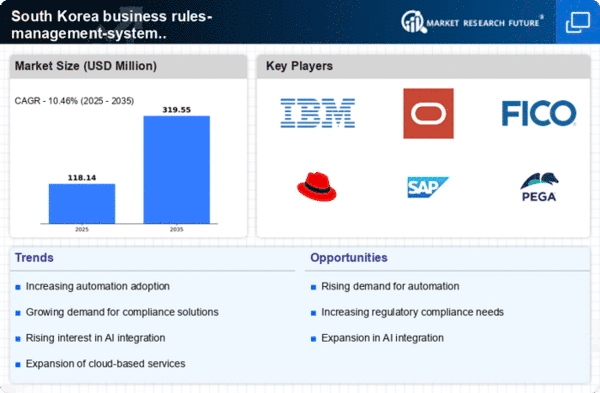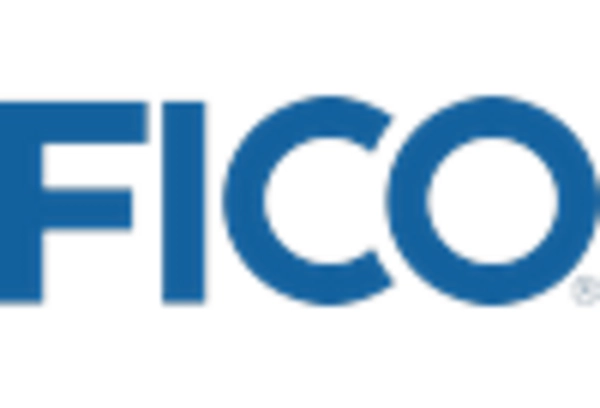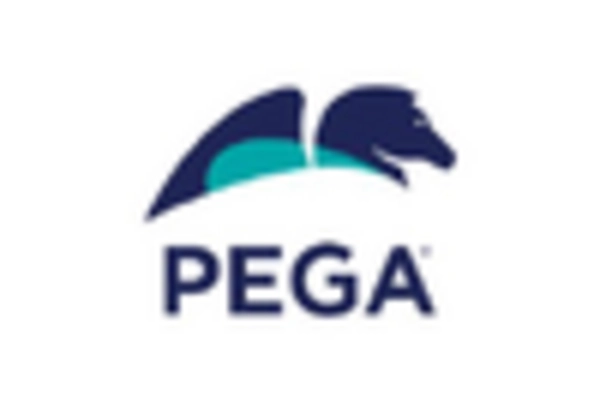Shift Towards Cloud-Based Solutions
The shift towards cloud-based solutions is reshaping the business rules-management-system market in South Korea. Organizations are increasingly adopting cloud technologies to enhance scalability, flexibility, and cost-effectiveness. Cloud-based business rules-management systems allow for easier updates and maintenance, reducing the burden on IT resources. Recent market analysis reveals that the adoption of cloud solutions can lead to a 15% decrease in IT operational costs. This trend indicates a growing preference for cloud-based systems as businesses seek to leverage the benefits of cloud computing while ensuring that their rules management processes remain efficient and effective.
Increased Focus on Customer Experience
In the competitive landscape of South Korea, enhancing customer experience has become a priority for many organizations. The business rules-management-system market is witnessing growth as companies seek to leverage rules management to personalize customer interactions and improve service delivery. By automating decision-making processes, businesses can respond more effectively to customer needs and preferences. Data indicates that organizations utilizing business rules-management systems can see a 20% increase in customer satisfaction scores. This driver suggests that the integration of customer-centric strategies through effective rules management is crucial for businesses aiming to retain and attract customers in a rapidly changing market.
Rising Demand for Operational Efficiency
The business rules-management-system market in South Korea is experiencing a notable surge in demand for operational efficiency. Organizations are increasingly recognizing the need to streamline processes and reduce operational costs. This trend is driven by the competitive landscape, where companies strive to enhance productivity and minimize errors. According to recent data, businesses that implement effective rules management can achieve up to 30% reduction in operational costs. As a result, the adoption of business rules-management systems is becoming essential for organizations aiming to optimize their workflows and improve decision-making processes. This driver indicates a shift towards more agile and responsive business models, which is likely to shape the future of the business rules-management-system market in South Korea.
Growing Complexity of Business Regulations
The complexity of business regulations in South Korea is a significant driver for the business rules-management-system market. As regulatory frameworks evolve, organizations face challenges in ensuring compliance with various laws and standards. This complexity necessitates the implementation of robust rules management systems to automate compliance processes and mitigate risks. Recent statistics suggest that companies investing in business rules-management systems can reduce compliance-related costs by approximately 25%. This trend highlights the importance of having a flexible and adaptive rules management framework that can quickly respond to regulatory changes, thereby enhancing the overall governance and risk management strategies within organizations.
Technological Advancements in Data Analytics
Technological advancements in data analytics are significantly influencing the business rules-management-system market in South Korea. As organizations increasingly rely on data-driven insights, the need for sophisticated rules management systems that can analyze and interpret large volumes of data becomes apparent. These systems enable businesses to make informed decisions based on real-time data analysis, thereby enhancing operational agility. Recent findings indicate that companies employing advanced analytics in conjunction with business rules-management systems can improve decision-making speed by up to 40%. This driver underscores the importance of integrating cutting-edge analytics capabilities into rules management to stay competitive in the evolving market landscape.
















